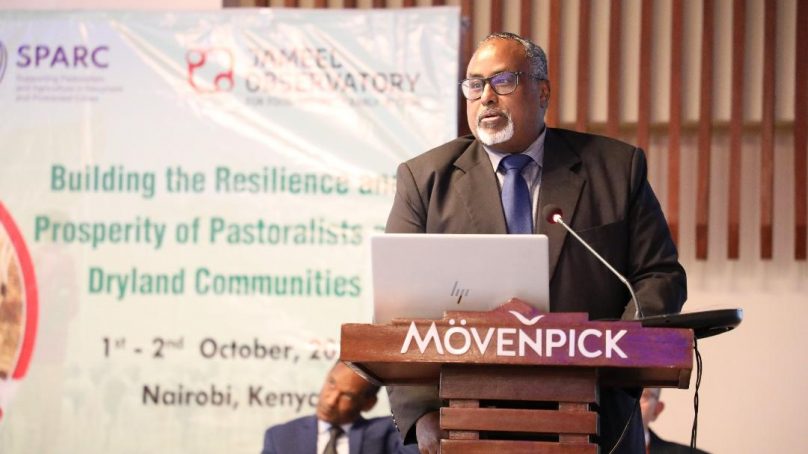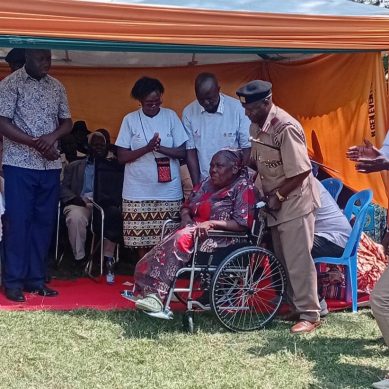
The government has called for robust investment in building resilience in pastoralist and dryland communities, urging policymakers and development partners to view the regions as national assets rather than marginalised areas.
Department of Arid and Semi-Arid Lands (ASALs) and Regional Development Principal Secretary Kello Harsama said Kenya’s drylands remain central to the country’s growth.
“ASALs cover 80 per cent of Kenya’s landmass, support millions of livelihoods and are home to rich cultures and ecosystems. These landscapes are not marginal; they are strategic national assets,” Harsama said.
In a speech read on his behalf by Acting Secretary in the Department of Arid and Semi-Arid Lands (ASALs) and Regional Development Ambrose Lorre during a forum on pastoralism and resilience in Nairobi, Harsama explained that pastoralism – rooted in dryland communities – is a dynamic and forward-looking system contributing significantly to food security, economic growth and ecological balance.
He noted that last year’s pastoralist policy dialogue in Wajir marked a turning point in Kenya’s approach, with bold commitments made on restoring rangelands, safeguarding pastoralist values and addressing land degradation.
“This forum is not just another meeting in a city hotel but a platform for deep reflection, collaboration and co-creation of solutions that are locally-led and globally relevant,” he said.
The principal secretary observed that that its outcomes will align with global discussions such as the 2026 International Year of Drylands and Pastoralism and the UNCCD COP17 in Mozambique.
Harsama urged participants to ensure no community is left behind and no rangeland lost to degradation, stressing that inclusive dryland investment remains a government priority under the Sectoral Policy Framework.
The principal secretary further suggested that future meetings should be held in locations of pastoralist communities rather than in capital cities. Inter-Governmental Authority on Development (IGAD) Deputy Executive Secretary Mohamed Abdi Ware underscored the importance of shifting perceptions about pastoralist communities.
“For IGAD, pastoralism is central because much of our landmass is arid or semi-arid. These regions are where peace, security and regional integration converge,” said Ware.
He challenged governments and partners to change the narrative from viewing pastoralists as marginalised or conflict-prone to recognising them as resilient and resourceful.
Ware also highlighted IGAD’s flagship programmes on pastoralism and the Drought Disaster Resilience, which has attracted significant investment from member states.
“Pastoralists occupy some of the most valuable land in our region. Without strong governance, these communities face enormous pressure from commercial and external interests. We must safeguard their rights and ensure pastoralist land use is sustainable,” Ware pointed out.
Executive Director of ENDA Energies and Chair of the Global Network for Disaster Reduction, Emmanuel Seck, addressed the human dimension of resilience, cautioning against approaches that exclude local communities.
“Beyond research and resilience, there is humanity. If we do not put people at the centre, then our work only benefits academics and policymakers without action on the ground,” Seck said.
He observed that marginalisation, lack of infrastructure and exclusion from political decision-making remain major challenges for dryland communities. Seck called for stronger cross-border cooperation through IGAD, the Great Green Wall and other regional frameworks to secure sustainable development.
He praised initiatives such as Supporting Pastoralism and Agriculture in Recurrent and Protracted Crises (SPARC) for advancing political dialogue on pastoralism and influencing global policy declarations linking climate change, conflict and peace.
Seck cited practical innovations including solar-powered milk chilling units, drought-resistant farming and agroforestry as examples of resilience at the community level.
“Drylands are not barren. They are rich in biodiversity, culture and solidarity. Where communities may appear to have little, they share everything. That is true wealth,” he said.
He, however, warned of the risks posed by declining international aid and shrinking climate finance, stressing that development risks becoming extractive and exclusionary if it ignores the socio-ecological realities of drylands.
The forum is expected to lay the groundwork for joint strategies to strengthen food security, promote regional integration and build a sustainable future for communities living in arid and semi-arid areas.
- A Tell Media / KNA report / By Naif Rashid/Darlene Kuria






